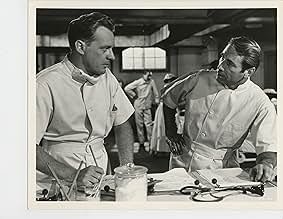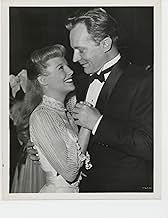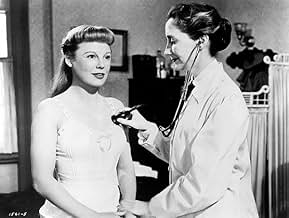Ajouter une intrigue dans votre langueA young woman decides to become a doctor at a time when women are not being made welcome in the field of medicine. Eventually, her determination and skills end up earning the respect of her ... Tout lireA young woman decides to become a doctor at a time when women are not being made welcome in the field of medicine. Eventually, her determination and skills end up earning the respect of her male counterparts.A young woman decides to become a doctor at a time when women are not being made welcome in the field of medicine. Eventually, her determination and skills end up earning the respect of her male counterparts.
- Réalisation
- Scénario
- Casting principal
Herbert Anderson
- Dr. Barclay
- (as Guy Anderson)
Avis à la une
What can I say about June Allyson, that hasn't been said, not much. I have enjoyed here work for many many years, when ever I see her photo I think to myself "high bar-ber-ree," and Van Johnson. This movies tells the story of a Woman's struggle to be a doctor in a male dominated field, but she handles herself very well, and truly makes her point. No, no, no, no blood, not a drop, and you can use the four letter words in this movie, in church, but it is not dry, no, no, no. Have to mention the scenes of the good doctor and the nurses trying to sober up a man who has a little too much of the creature, it is funny. Young Women, from pre-teens up, can get a boost from this movie, and have them feeling like they can make it, which ain't bad. Don't kiss of this movie guys, you may like it as much as I, she is very cute, and the way she works around things is masterful at times.
Well worth the price of rental/buy, give it a chance.
Well worth the price of rental/buy, give it a chance.
Based on the memoirs of her character Ann Dunning Barringer, June Allyson gets
to play a woman doctor at a time when there weren't too many. The time of
the turn of the last century is captured very well.
Her own role model is that of Mildred Dunnock also a physician of the female gender who has had to be most discreet in order to earn a living in the medical profession. Allyson is not about discretion.
In fact as Allyson becomes a hero to the nurses in and around 1900 it wasn't that long ago that Florence Nightingale and Clara Barton opened the nursing profession for women. For them Allyson is dreaming the impossible dream.
The men in her life include Arthur Kennedy whom she breaks things off with because he a doctor wants his woman home with supper on the table and her supervisor Gary Merrill who also thinks there are men doctors and women nurses and the twain shall not meet. A man who believes in specific gender roles.
The Girl In White has a fine ensemble cast who give great support to Allyson who must have been grateful to get away from girl next door roles.
Her own role model is that of Mildred Dunnock also a physician of the female gender who has had to be most discreet in order to earn a living in the medical profession. Allyson is not about discretion.
In fact as Allyson becomes a hero to the nurses in and around 1900 it wasn't that long ago that Florence Nightingale and Clara Barton opened the nursing profession for women. For them Allyson is dreaming the impossible dream.
The men in her life include Arthur Kennedy whom she breaks things off with because he a doctor wants his woman home with supper on the table and her supervisor Gary Merrill who also thinks there are men doctors and women nurses and the twain shall not meet. A man who believes in specific gender roles.
The Girl In White has a fine ensemble cast who give great support to Allyson who must have been grateful to get away from girl next door roles.
This is a fairly accurate re-telling of the Emily Dunning story. She was a turn of the century doctor, and being a woman doctor, therefore treated like a freak, or publicity hound. Sadly, the tale is always the same: woman/minority enters field dominated by white males and is mistreated and pressured to quit. Dunning was a doctor decades before women were given the right to vote! And she didn't just deliver babies, she was out on ambulance calls day and night. Quite an impressive figure, but June Allyson (reminding me of a more winsome version of ER's Maura Tierney) is only adequate as Dunning. The film has its moments, yet the struggles Dunning truly incurred in overcoming the male doctor establishment and public attitude is only moderately presented here. It's as if the male dominated film-making establishment didn't want their doctor counterparts to look too bigoted. And much of the film is devoted to Allyson's relationship with Arthur Kennedy (Dr. Barringer -- in real life became her husband). Once again, the filmmakers are more concerned with stressing the standard woman-as-love-interest-only angle. It also starts to slow down in the second half, unfortunately. But this is the only film covering Dunning's interesting story so it's worth looking at at least for that reason.
What I liked most is that this movie's based on the life of Dr. Emily Dunning Barringer, so they have to give this biopic a dose of realism. So, the story doesn't go over-the-top with the man vs. Woman/career vs. Homemaker thing and comes across as genuine.
It was also nice to see June Allyson in a role that wasn't either the ingenue or the good wife.
The early 20th century wasn't an easy time for a woman doctor, though many (like Dr. Barringer) were willing to put up with whatever was thrown their way, in order to practice medicine.
Some of the opposition was unbelievable, like when Dr. Seth Pawling (Gary Merrill) is reluctant to hire her, despite her having graduated third in her med school class! He insists women don't have what it takes to be good doctors, though she soon proves him wrong!
She does a great job, first on ambulance duty, later saving a life despaired of, and then during a typhoid epidemic.
She has some clashes with Ben Barringer, (Arthur Kennedy) the doctor she loves, with both making sacrifices, both for their careers and for each other, which sets the stage for their future together.
I've said enough and won't give away more. Just check it out, as it's worth it.
It was also nice to see June Allyson in a role that wasn't either the ingenue or the good wife.
The early 20th century wasn't an easy time for a woman doctor, though many (like Dr. Barringer) were willing to put up with whatever was thrown their way, in order to practice medicine.
Some of the opposition was unbelievable, like when Dr. Seth Pawling (Gary Merrill) is reluctant to hire her, despite her having graduated third in her med school class! He insists women don't have what it takes to be good doctors, though she soon proves him wrong!
She does a great job, first on ambulance duty, later saving a life despaired of, and then during a typhoid epidemic.
She has some clashes with Ben Barringer, (Arthur Kennedy) the doctor she loves, with both making sacrifices, both for their careers and for each other, which sets the stage for their future together.
I've said enough and won't give away more. Just check it out, as it's worth it.
The Girl in White might be seen as a feminist drama by some. It concerns a woman at the turn of the century who wants to become a doctor (June Allyson) who faced adversity when the men around her try to squash her dreams. She prevails and wins their respect including that of the man who wants to marry her (Arthur Kennedy). The reason this movie works is that the message isn't pushed upon the audience the way it would be if the film were remade today. It is somewhat inspirational, but mostly it just tells a story.
Allyson is great as always and very sweet. A line from the movie describes her well, "You just make people feel good so that they forget themselves, their own troubles. Sometimes that means more than any medicine." The man who speaks the lines, Kennedy, is excellent in this film. He has mastered the art of showing emotions without verbally referencing them first.
Allyson is great as always and very sweet. A line from the movie describes her well, "You just make people feel good so that they forget themselves, their own troubles. Sometimes that means more than any medicine." The man who speaks the lines, Kennedy, is excellent in this film. He has mastered the art of showing emotions without verbally referencing them first.
Le saviez-vous
- AnecdotesBased on the life of Emily Dunning Barringer (1876-1961). She graduated from Cornell University School of Medicine in 1901. Her surgical residency was at Gouverneur Hospital in Lower Manhattan, New York City.
Meilleurs choix
Connectez-vous pour évaluer et suivre la liste de favoris afin de recevoir des recommandations personnalisées
Détails
Box-office
- Budget
- 1 088 000 $US (estimé)
- Durée
- 1h 32min(92 min)
- Couleur
- Rapport de forme
- 1.37 : 1
Contribuer à cette page
Suggérer une modification ou ajouter du contenu manquant































